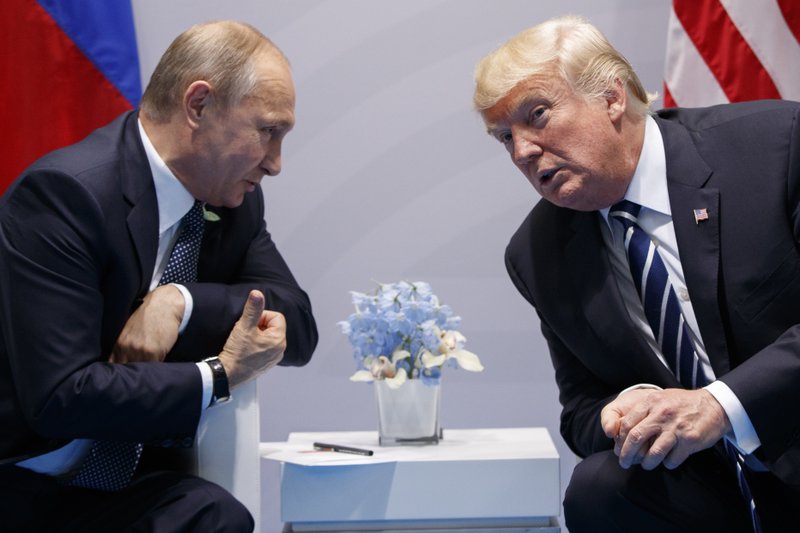DAMASCUS, Syria -- The United Nations on Saturday welcomed the agreement struck between the United States and Russia for a cease-fire in southwest Syria, saying a pause in fighting would support upcoming peace talks.
The U.N.'s deputy special envoy to Syria, Ramzy Ramzy, said he hopes the agreement announced a day earlier in Hamburg, Germany, will lead to similar arrangements elsewhere in Syria to reduce the violence.
"The U.N. is always seeking to reduce tension and escalation in fighting, and I think this is a step in the right direction," he told reporters in Damascus. "All this is obviously support for the political process."
The cease-fire goes into effect today at noon Damascus time, with no end date, according to U.S. officials and the Jordanian government, which is also involved in the deal.
Russian officials said Russian military police would monitor the new truce, but U.S. officials said the details were still under discussion.
Earlier in the week, Syria's military said it was halting combat operations in the southern provinces of Daraa, Quneitra and Sweida for four days, in advance of a new round of Russian-sponsored talks in Kazakhstan. The Syrian government temporarily extended the unilateral cease-fire.
Syrian opposition activists reported low-level violence in Daraa on Saturday, after weeks of intense fighting in the divided province. Nabaa media and the Britain-based Syrian Observatory for Human Rights said a woman was killed when government helicopters dropped barrel bombs on a village in northeastern Daraa.
The Observatory said a total of 16 such bombs were dropped in the area, wounding several people.
The U.S.-Russia truce should help allay growing concerns by Syria neighbors Jordan and Israel about Iranian military ambitions in the area, including fears that Tehran plans to set up a disruptive long-term presence there, officials said.
Such apprehensions were stoked by recent movements of Shiite Muslim militias -- loyal to Iran and fighting alongside Syrian government forces -- toward Jordan's border with Syria, and to another strategic area in the southeast, close to where the two countries meet Iraq.
The advances are part of Syrian President Bashar Assad's push to regain territory from rebel groups, some backed by the West, in Daraa and from Islamic State extremists in the southeast, near the triangle with Iraq.
But Syria's neighbors have said they suspect that Iran is pursuing a broader agenda, including carving out a land route through Syria that would create a territorial continuum from Iran and Iraq to Lebanon.
The cease-fire is meant to keep all forces pinned to their current positions, the Jordanian government said.
This would prevent further advances by forces under Iran's command, including Lebanon's Hezbollah militia.
The truce is to be monitored through satellite and drone images as well as observers on the ground, a senior Jordanian official said Saturday, speaking on condition of anonymity because he was not authorized to discuss details with reporters.
Information on truce compliance could be shared and discussed in different locations, including Jordan, the official said. Israel did not participate in the truce talks, but was presumably briefed by the U.S., the Jordanian official said.
Israel is expected to watch for truce violations, as it has repeatedly said it will not allow Iran to set up a permanent presence in Syria.
Israel has carried out a number of airstrikes in Syria against suspected shipments of "game-changing" weapons bound for Hezbollah.
"The question and concern is of course if it will be exploited by the Syrian regime, Hezbollah and Iran to create new facts on the ground," said Chagai Tzuriel, the director general of Israel's Intelligence Ministry.
Ahead of Friday's truce announcement, Jordanian and Israeli officials expressed concerns about Iranian ambitions.
The Jordanian official said the international community, regional powers and Jordan would not tolerate the creation of a "land line all the way from Tehran to Beirut."
Such a "Shiite crescent" would disrupt the regional balance and be considered a "super red line," he said, referring to rival Sunni and Shiite Muslim political camps led by Saudi Arabia and Iran, respectively.
Previous cease-fires in Syria have collapsed or failed to reduce violence for long, and it was unclear whether the latest deal would fare any better.
The deal is separate from an agreement that Russia, Turkey and Iran struck earlier this year to try to establish "de-escalation zones" in Syria.
The U.S., also wary of Iran's involvement, stayed away from that effort.
Follow-up talks last week in Kazakhstan were unable to produce agreement on finalizing a cease-fire in those zones.
A new round of U.N.-sponsored peace talks is to be held in Geneva on Monday. Those talks, aimed at forming a transitional government and fighting terrorism, have made little progress since they resumed earlier this year.
Information for this article was contributed by Karin Laub and Josef Federman of The Associated Press.
A Section on 07/09/2017

